The HTC One (M8) Review
by Anand Lal Shimpi & Joshua Ho on March 26, 2014 7:00 PM EST- Posted in
- Smartphones
- HTC
- Mobile
- HTC One
Battery Life
The new One features an integrated 3.8V 2600mAh battery (9.88 Wh), a 13% increase in capacity compared to the previous model. The battery comparison isn’t that simple however. The M8 has a larger display (5” vs 4.7”) but it also has a higher performing and more power efficient SoC (Snapdragon 801 vs. 600). To find out how the new One stacks up against its predecessor, we turn to a mix of old and new battery life tests to help better characterize the device.
We’ll start with our standard browser based battery life tests. Keep in mind here these tests are as much about replicating a particular CPU profile as they are about loading specific web pages in order.
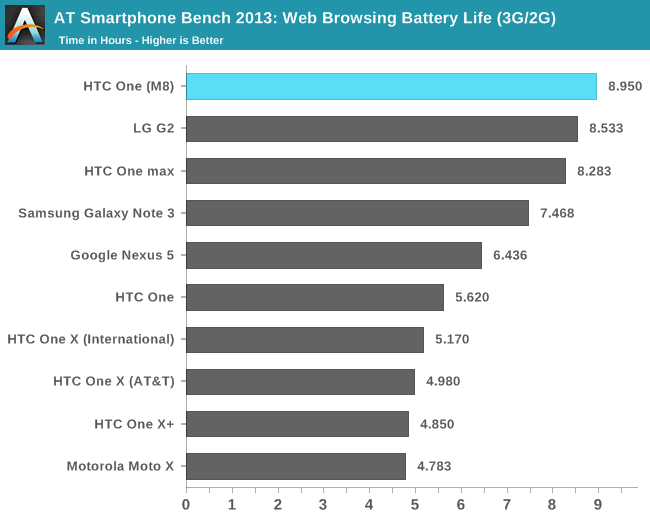
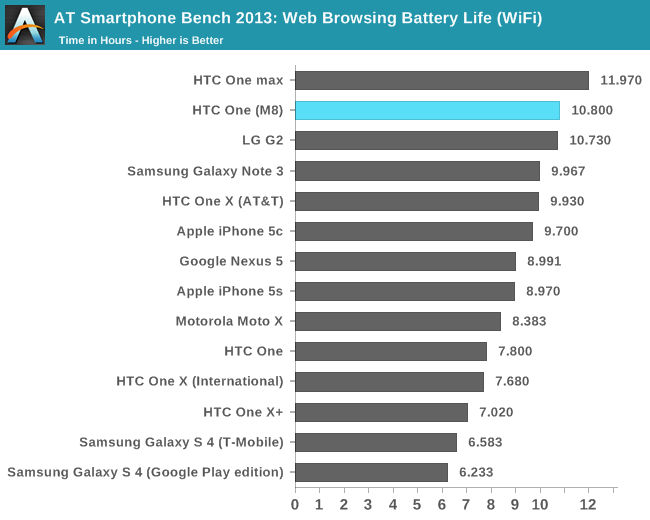
We saw a substantial gain in battery life with Snapdragon 800, and 801 extends that even further. For the same, relatively light (yet constant) workload, the M8 improves battery life over the M7 by as much as 71%. On WiFi the advantage drops to only 38%, but we’re still talking about absolutely huge generational gains.
A constant workload is only one part of the story though. More often than not, when you’re faced with faster compute you end up doing more. To see what the other extreme of battery life looks like I turned to two canned tests: BaseMark OS II and GFXBench 3.0.
I ran both of these tests under the same controlled conditions we always use, with all displays calibrated to 200 nits. BaseMark OS II runs through a bunch of CPU and storage benchmarks (basically the same tests used for the BaseMark OS II system and memory tests), as fast as possible, until the battery dies.
I like this benchmark as it gives us an indication of worst case battery life if you’re absolutely hammering the CPU (and storage) relentlessly.
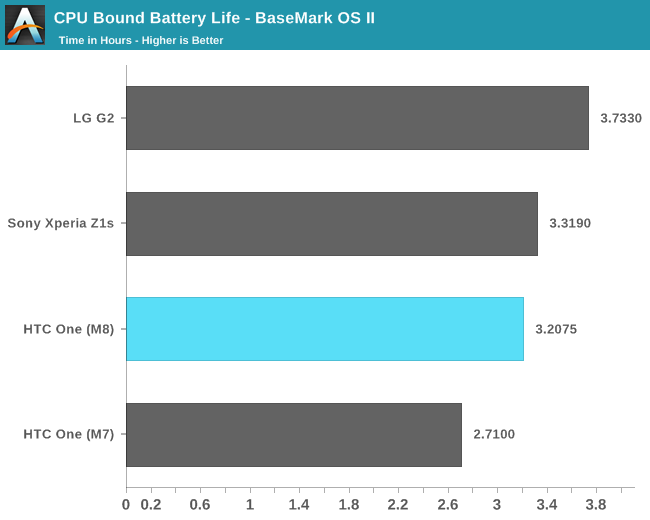
Despite the faster CPU cores, the M8’s battery life actually goes up compared to M7. Here we’re really seeing the benefits of 801’s updated 28nm HPm process compared to the Snapdragon 600’s 28nm LP process.
GFXBench provides a similar test, with effectively uncapped performance (on today’s devices at least since we’re not hitting v-sync limits), but stressing the GPU instead of the CPU. Here we’re running the T-Rex HD benchmark, onscreen, until the battery dies.
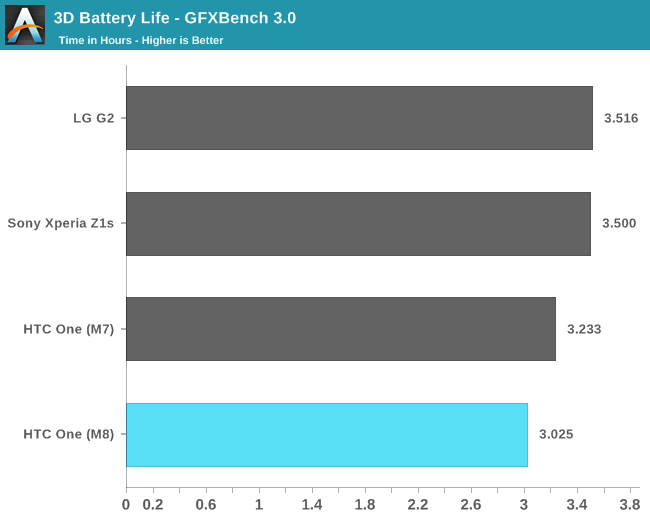
This is the first and only test we’ve got here that shows a regression in battery life compared to M7. The M8 loses about 6% of runtime compared to the M7, despite having a larger battery. Now look at what happens if we look at performance at the end of the run:
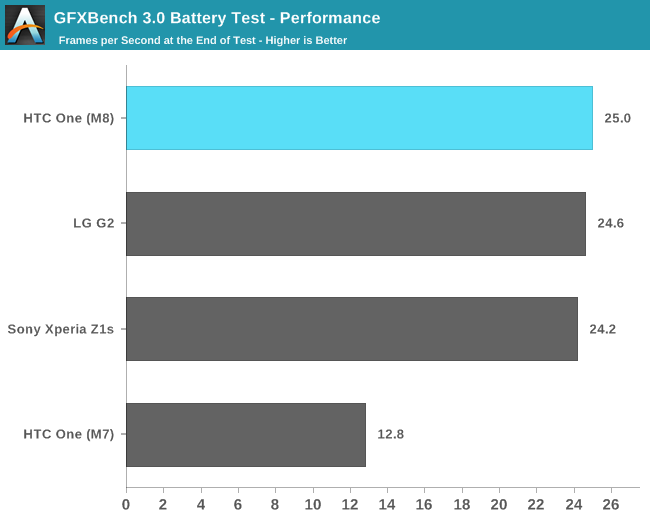
Now the M8’s battery life regression doesn’t look so bad. You give up 6% of runtime but you get almost twice the performance compared to M7. Snapdragon 801 is just a huge upgrade compared to 600.
Charge Time
The M8 features a Qualcomm Quick Charge 2.0 enabled PMIC, which enables faster battery charge times through higher voltage charging. Unfortunately the in-box wall adapter is only Quick Charge 1.5 compliant so you'll only pull 7.5W from the wall. HTC expects to offer a Quick Charge 2.0 compliant power adapter later this year.
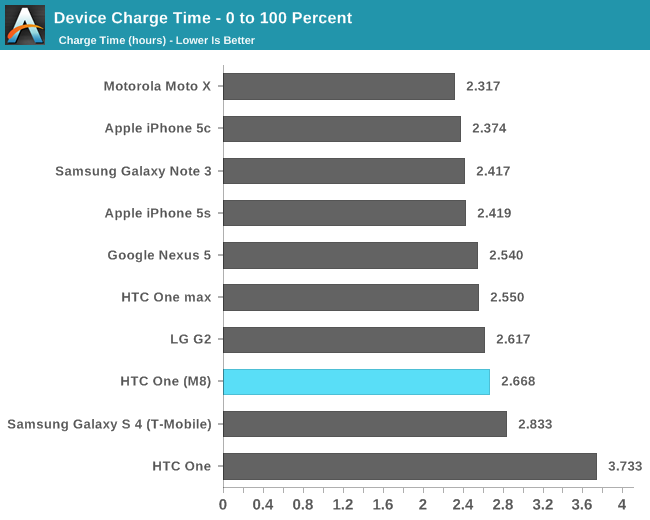
The M8's charge time is a bit slow compared to what we've seen from other devices with larger batteries.










222 Comments
View All Comments
Johnmcl7 - Sunday, March 30, 2014 - link
Because there is no such thing as an absolute phone - everyone has different preferences and the market reflects that. I much prefer Samsung's lighter and durable plastic construction which can hold up to daily use and allows a removable battery rather than HTC's heavier metal cases which if used without a case easily pick up scuffs and scratches making them look decidedly second hand within a matter of months.w2aith - Friday, March 28, 2014 - link
Fantastic phone. Good weight, great hand feel. Faster than I expected. Camera is unimpressive, but that is not what i look for in a phone. Sound quality from the speakers on the phone is the best I've heard.Death666Angel - Friday, March 28, 2014 - link
"There’s nothing more to say other than I’m disappointed."Golden! Is it wrong that I read that in my head in Jon Stewart's Jewish Mother voice? :D
Death666Angel - Friday, March 28, 2014 - link
Just finished reading your review.Feeling kinda underwhelmed by the M8. First off, I don't really care about the all metal design of a phone. I can appreciate that for all of 2 seconds before I put a plastic case on it and never see the body again unless it is for cleaning. So that advantage is lost for me. I want to like the camera and I kinda do. But 4MP is too low for me. Decrease pixel size, increase the sensor size a bit and give me 6 or 8. I don't need 13MP at 1.12 (?) um, but 4MP@2um is just not good enough, especially as a follow up to that same camera. I don't do that much low-light photography either, but I've used my SGS2 as a camera on holidays when my point and shoot was low on batteries, so outdoor pictures are very important. Losing OIS is an astonishing move and puzzles me greatly. The 801 is looking pretty cool, the mSD card helps, but those aren't unique features. For the price, the display needs to be calibrated better (although I also don't care much about that). I don't really care about the sound of a phone because my usage model does not involve playing anything without headphones plugged in.
The old M7 is still ~70 to 120€ more expensive than any of its competitors phones (Nexus 5, LG G2, SGS4, Xperia Z, not comparing the same capacities, because I am fine with 16GB on my phone), so I don't think the new M8 will be a price competitive offering. I don't see myself being impressed by the SGS5 either. Note 4 maybe? Haven't heard too much about it. But any smartphone that costs over 400€ needs to offer some serious advantages to get me to consider it instead of a Nexus.
If Nexus 5.2 gets a bigger battery, marginally faster SoC at better power characteristics and a better performing camera (1.4 - 1.7 um with 6 or 8MP image and OIS and a 4 or 5MP front facing camera), I'll be a happy boy and upgrade from my Galaxy Nexus.
tvandegr - Friday, March 28, 2014 - link
Do we know if the Developer edition or the unlocked edition support carrier aggregation? They seem to be based off of the ATT model from what I have seen other places.skylinkdave - Friday, March 28, 2014 - link
You know what's even more fun than a fiddly phone camera? A real camera that's able to do all of this in-camera without all the post.ol1bit - Saturday, March 29, 2014 - link
As always, Anandtech is spot on with the review. Good Job! Just read some of the other reviews for comparison.pdc200 - Saturday, March 29, 2014 - link
Hmmmm so what happened to reviewing things like Call Quality, Boomsound Quality and loudness? Quality of Audio from the Headphone jack?ghm3 - Saturday, March 29, 2014 - link
I've been eagerly awaiting the Sony Xperia Z2 ever since MWC, and this review doesn't change that at all, but at this is clearly my next choice. The addition of a micro SD slot makes this far more appealing to me now.Either way I'm so done with Samsung's cheap garbage loaded with shitware you can't remove without cracking the phone. Beyond the hardware with the Z2 I'm really looking forward to the mostly un-molested Android build on it. Can anyone provide insight into how HTC is in this department?
thisiskicker - Sunday, March 30, 2014 - link
Awesome It has a micro SD card expansion. This is what phones are now a days are missing.